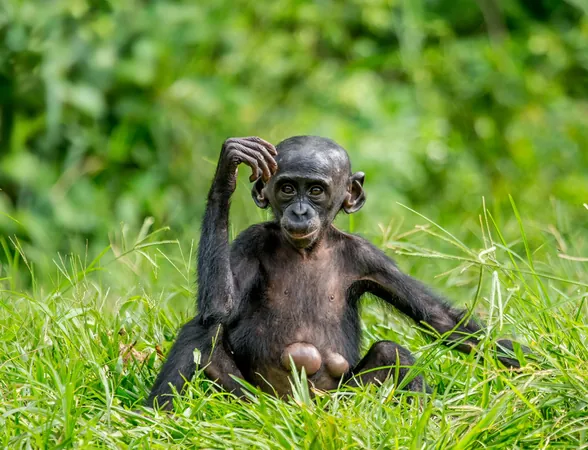
Orphaned Bonobos: Astounding Resilience and Social Skills Unveiled by Groundbreaking Study
2024-12-18
Author: Wei
Orphaned Bonobos: Astounding Resilience and Social Skills Unveiled by Groundbreaking Study
In a remarkable testament to resilience, orphaned bonobos—victims of the illegal wildlife trade—are demonstrating their capacity to regain vital social skills and empathy, revealing fascinating insights into their emotional development. A new study spearheaded by researchers at Durham University uncovers the potential of these orphaned primates to recover from traumatic experiences, developing social capabilities comparable to those of bonobos raised in a natural environment.
The study underscores the plight of bonobos, who are closely related to humans, creating a powerful link that enriches our understanding of social behavior and evolution. Originating solely from the Democratic Republic of Congo (DRC), bonobos are currently facing dire threats, including habitat destruction from logging and the illegal hunting of wildlife for bushmeat.
The Impact of Trauma on Young Bonobos
Orphaned at a tender age, many bonobos have been separated from their mothers due to illicit trade. This separation deprives them of essential maternal care and socialization, crucial elements for learning important social behaviors and emotional skills. These orphans often struggle to develop connections with their peers, impacting their ability to exhibit empathy and understand group dynamics necessary for survival in the wild.
The Role of Rehabilitation in Their Development
The pioneering research, which spanned ten years and was conducted at the Lola ya Bonobo sanctuary, sought to evaluate how rehabilitation services influence the social skills of orphaned bonobos relative to those raised by their mothers. The data revealed that, while orphaned bonobos exhibited some limitations—such as a decrease in empathetic behaviors like comforting distressed peers—their development showcased species-typical behaviors within acceptable ranges.
Notably, female bonobos demonstrated a consistent improvement in social skills as they matured, reflecting the matriarchal nature of bonobo societies, while male bonobos displayed a decline in their social abilities as they aged. This gender difference in development raises critical questions about the social dynamics in bonobo communities and their implications for conservation efforts.
A Glimmer of Hope for the Future
The findings from Durham University reveal that, despite their tough beginnings, orphaned bonobos have the potential to reintegrate into social groups, which is essential for their survival. Study lead author Stephanie Kordon emphasizes that while orphaned bonobos may not achieve full rehabilitation, their social development is progressing well.
The research advocates for the essential role of sanctuaries in providing these vulnerable apes with a second chance at life. By understanding how early-life experiences shape social and emotional skills, researchers can enhance rehabilitation and conservation strategies aimed at preserving this endangered species.
Moreover, the implications of this research extend beyond individual orphaned bonobos; successful rehabilitation programs contribute to larger conservation goals. By equipping bonobos with the necessary social skills before reintroducing them into the wild, sanctuaries like Lola ya Bonobo are pivotal in ensuring that these magnificent creatures can thrive in their natural habitats once more.
As the global community continues to grapple with conservation challenges, this study serves as a beacon of hope, showcasing the extraordinary resilience of orphaned bonobos and the paramount importance of dedicated efforts in wildlife rehabilitation. With ongoing support and innovative research, the future of bonobos may be brighter than ever.



 Brasil (PT)
Brasil (PT)
 Canada (EN)
Canada (EN)
 Chile (ES)
Chile (ES)
 España (ES)
España (ES)
 France (FR)
France (FR)
 Hong Kong (EN)
Hong Kong (EN)
 Italia (IT)
Italia (IT)
 日本 (JA)
日本 (JA)
 Magyarország (HU)
Magyarország (HU)
 Norge (NO)
Norge (NO)
 Polska (PL)
Polska (PL)
 Schweiz (DE)
Schweiz (DE)
 Singapore (EN)
Singapore (EN)
 Sverige (SV)
Sverige (SV)
 Suomi (FI)
Suomi (FI)
 Türkiye (TR)
Türkiye (TR)